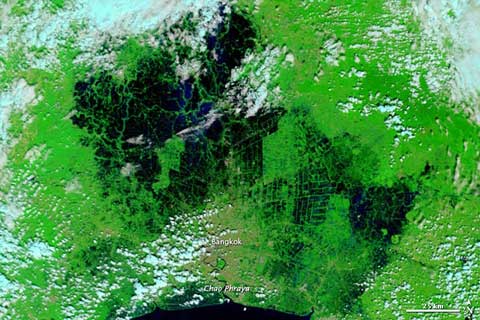 In my column at The Daily Blog today, I ruminate on the links between the historic and damaging floods in central Europe and the rapid warming of the Arctic. What will it take to make the world’s leaders wake up to the rapid changes that are happening now? Comments at TDB, please…
In my column at The Daily Blog today, I ruminate on the links between the historic and damaging floods in central Europe and the rapid warming of the Arctic. What will it take to make the world’s leaders wake up to the rapid changes that are happening now? Comments at TDB, please…
Tag: floods
The truth is molten
 Extreme weather events are where the climate change rubber hits the road, and if events over the last month are anything to go by, global warming is currently doing doughnuts and burnouts on tarmac right round the globe. Kevin Trenberth put it rather nicely in an interview with PBS Newshour in the US: “This is a view of the future, so watch out.” John Vidal in The Guardian sums up the situation rather well:
Extreme weather events are where the climate change rubber hits the road, and if events over the last month are anything to go by, global warming is currently doing doughnuts and burnouts on tarmac right round the globe. Kevin Trenberth put it rather nicely in an interview with PBS Newshour in the US: “This is a view of the future, so watch out.” John Vidal in The Guardian sums up the situation rather well:
…how much more extreme weather does it take for governments and individuals to act, or for the oil companies to withdraw from the Arctic, or the media to link global warming with the events now being witnessed around the world? Must the sea boil, the Seine run dry, New York flood and the London Olympics be consumed by fire before countries are shocked into taking concerted action?
Damn good question.
The Climate Show #23: Durban and the return of the electric car
[youtube]tbmbC8dXOiU[/youtube]
Grab some holly, deck your halls, heat up some mince pies, and then settle down to the last Climate Show of 2011. We look at the outcome of the Durban conference, discuss heavy rain in New Zealand and record-breaking weather extremes in the USA, and ponder the implications of news of more methane erupting from the seabed off Siberia. Glenn interviews Chris Paine, director of EV documentary Revenge of the Electric Car, and we round off the show with some optimistic news on possible energy solutions.
Watch The Climate Show on our Youtube channel, subscribe to the podcast via iTunes, listen to us via Stitcher on your smartphone or listen direct/download from the link below the fold…
Follow The Climate Show at The Climate Show web site, and on Facebook and Twitter.
Continue reading “The Climate Show #23: Durban and the return of the electric car”
The Climate Show #21: carbon, coal and Cook on BEST
[youtube]AuMJ0teoBAo[/youtube]
Bad news on carbon emissions balanced by good news on solar photovoltaics, a Medicane bringing dramatic flash flooding to Italy and France, a scientist who thinks the Arctic could be effectively ice free in late summer in only four years, and the inside story on what the New Zealand election might mean for climate policy down under. John Cook joins us to talk about the new BEST temperature record (great gifs, Dana!), and in the solutions section Gareth and Glenn talk about solar powered airships, China’s plans to ban incandescent light bulbs, and a continent spanning €400bn solar thermal power plan for North Africa, Europe and the Middle East. All this and more as The Climate Show comes of age with its 21st show…
Watch The Climate Show on our Youtube channel, subscribe to the podcast via iTunes, listen to us via Stitcher on your smartphone or listen direct/download from the link below the fold…
Follow The Climate Show at The Climate Show web site, and on Facebook and Twitter.
Continue reading “The Climate Show #21: carbon, coal and Cook on BEST”
Wake of the flood (first reprise)
Thailand is experiencing its worst monsoon flooding for at least 50 years. The NASA Earth Observatory image above shows the waters piling up to the North of the capital Bangkok, which is already beginning to experience flooding (visit the EO page to see a comparison with earlier floods, and The Guardian for a striking set of flood pictures). The Thai government yesterday declared a five day weekend to allow the city’s inhabitants to make preparations. The intense monsoon season has also brought extensive flooding to Cambodia and northeastern India over the last couple of months, and destroyed a significant part of SE Asia’s rice crop. On the other side of the planet, heavy rain and flooding has been affecting Mexico, El Salvador, Costa Rica, Honduras, Guatemala, and Nicaragua. Jeff Masters reported that in the ten days up to October 20th, Huizucar in El Salvador received an astonishing 1.513 metres of rain.
At first glance, it looks like a continuation of the remarkable series of extreme weather events — especially heavy rainfall and flooding — that we’ve seen over the last few years. But apart from the human suffering and economic dislocation being experienced around the world, it appears there’s another interesting consequence of all this precipitation — it’s causing global sea level to fall.

